Harmony
Barry Manilow and Bruce Sussman’s historical musical tells the story of the internationally famous Comedian Harmonists destroyed by the Nazis in 1930's Berlin.
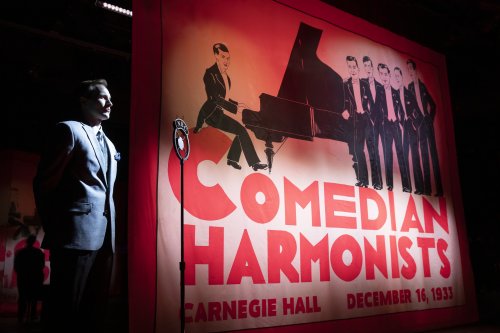
Andrew O’Shanick as the Radio Announcer in a scene from the National Yiddish Theatre Folksbiene production of the Barry Manilow/Bruce Sussman musical “Harmony” at the Museum of Jewish Heritage (Photo credit: Julieta Cervantes)
[avatar user=”Victor Gluck” size=”96″ align=”left”] Victor Gluck, Editor-in-Chief[/avatar]
Although 25 years have gone by since Harmony first tried out at the La Jolla Playhouse in San Diego, the Barry Manilow/Bruce Sussman musical about the Comedian Harmonists is still relevant and timely. This historical musical based on true events which took place mainly in Germany from 1927- 1935 is a necessary reminder of the rise of Nazism and the naïve people who thought it would blow over. Produced by the National Yiddish Theatre Folksbiene at the Museum of Jewish Heritage, Harmony could not be in a more fitting setting to tell this story. Directed and choreographed by Warren Carlyle, the musical has been given a big Broadway-style production for its first New York appearance starring Chip Zien and Sierra Boggess as well as a cast of featured players.
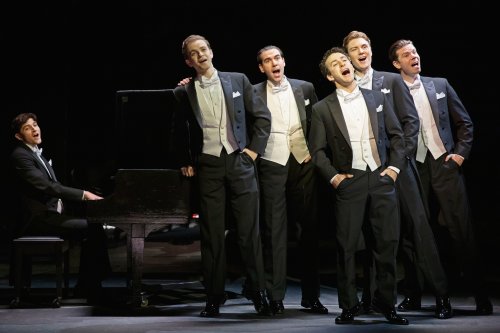
Blake Roman at the piano with Steven Telsey, Zal Owen, Danny Kornfeld, Eric Peters and Sean Bell as the Comedian Harmonists in a scene from the National Yiddish Theatre Folksbiene production of the Barry Manilow/Bruce Sussman musical “Harmony” at the Museum of Jewish Heritage (Photo credit: Julieta Cervantes)
The Comedian Harmonists were an all-male German close harmony comic and musical troupe of six performers some who were Jewish and some gentile, based in Berlin. They became international celebrities in the late 1920’s and early 1930’s as well as making 15 movies before they were banned from performing due to the German racial laws concerning Jews. Narrated by Zien as an older Rabbi, the oldest surviving member of the troupe (who lived until 1998), the story begins with their legendary Carnegie Hall concert on December 16, 1933 and then travels back to their formation in 1927 in Berlin. Brought together by tenor Harry (Zal Owen) who was also a lyricist, the group consisted of Lesh, first tenor (Steven Telsey), Erich, second tenor (Eric Peters), Joe, baritone, known as Young Rabbi (Danny Kornfeld), Bobby, bass (Sean Bell), and Erwin known as Chopin, their pianist and composer (Blake Roman).
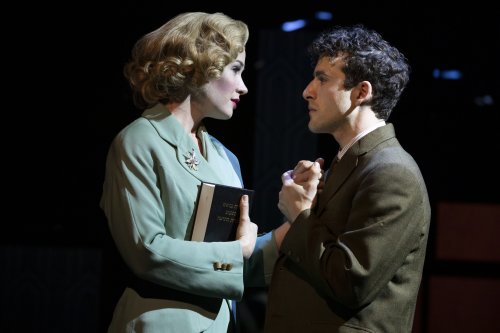
Sierra Boggess and Danny Kornfeld in a scene from the National Yiddish Theatre Folksbiene production of the Barry Manilow/Bruce Sussman musical “Harmony” at the Museum of Jewish Heritage (Photo credit: Julieta Cervantes)
We mostly follow young Rabbi and his relationship with the gentile Mary (Boggess) who eventually converts before marriage and Chopin and his Jewish girl friend Ruth (Jessie Davidson) who are eventually torn apart by religious problems even though they marry. Also prominent is Erich who turns out to be from a very wealthy and prominent family and seems to know everyone, from Marlene Dietrich to Josephine Baker. They start out as The Melody Makers but after a comic turn backing up Dietrich in a cabaret they become The Comedian Harmonists. After their New York triumph they have a chance to stay in the United States but miss the writing on the wall and (all except Rabbi) believe their best bet is to return to Berlin. Back in Berlin more and more restrictions are placed on them until the Nazis ban them altogether from continuing as a group in 1935. Zien as the older Rabbi tells us the shocking fate of all six men and the two wives.
In Sussman’s book, the first act is rather generic of the backstage stories dealing with the rise of successful theater people. However, as Nazism raises its ugly head, the second act speeds up and becomes more compelling and eventful. While Manilow’s melodic music to Sussman’s heartfelt lyrics is unlike Marilow’s own repertoire, the score is very much in the Broadway theater tradition. In fact, The Sound of Music, Fiddler on the Roof, Cabaret and Merrily We Roll Along are either quoted or referred to in homage. Carlyle has given the comic numbers the best staging, but the ballads like “And What Do You See” and “Where You Go” are the loveliest. His comic staging of the production numbers “Lost In the Shadows” with the men’s sextet backing up Dietrich behind a curtain, “How Can I Serve You, Madame?” in which the sextet come on without pants as waiters, the clever parody, “Hungarian Rhapsody #20,” and the scathingly political “Come to the Fatherland” are hilarious entertainments.
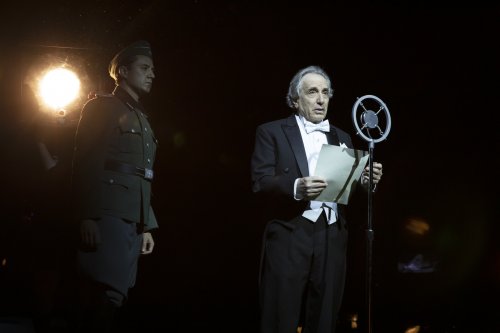
Zak Edwards and Chip Zien in a scene from the National Yiddish Theatre Folksbiene production of the Barry Manilow/Bruce Sussman musical “Harmony” at the Museum of Jewish Heritage (Photo credit: Julieta Cervantes)
Under Carlyle’s direction the cast is both energetic and animated. Zien proves his versatility joining the younger men in several of their numbers, particularly the title song, and impersonates an uncredited Dietrich, Strauss, and Albert Einstein along the way. He also gets his own impassioned number entitled “Threnody” performed at the end of each act. Both Kornfeld as the high-strung younger Rabbi and Roman as the raucous Chopin are bundles of energy. Boggess and Davidson make an interesting contrast with Boggess’ Mary understanding and clear-headed while Davidson’s Ruth is tense and fervent. Peters’ Erich is smooth and urbane as the society member who has a secret of his own. Ana Hoffman is a sexy Josephine Baker but does not really suggest the actual performer.
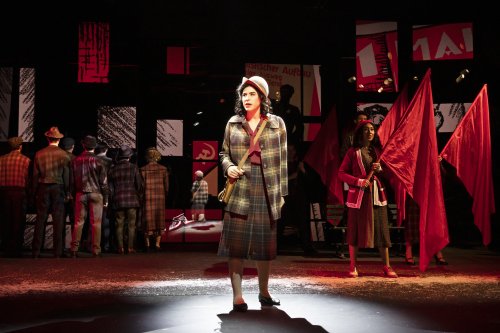
Jessie Davidson and ensemble in a scene from the National Yiddish Theatre Folksbiene production of the Barry Manilow/Bruce Sussman musical “Harmony” at the Museum of Jewish Heritage (Photo credit: Julieta Cervantes)
Beowulf Boritt’s unit set for Berlin and elsewhere seems to have borrowed Cabaret’s mirrored back wall, but the limited pieces of scenery allow the show to flow swiftly from one scene to the other. Linda Cho and Ricky Lurie have designed an impressive collection of 1920’s and 30’s period costumes for the large cast. Jules Fisher and Peggy Eisenhauer’s lighting design offers a variety of onstage and off stage looks including some mood colored sequences in red and later purple. The excellent sound design is by Dan Moses Schreier. The production also makes use of video design by batwin + robin productions for historic footage as well as scene enhancers. For the record, the musical arrangements are by Manilow himself, the orchestrations by Doug Walter, and the vocal arrangements by Manilow and John O’Neill also acts as the accomplished music director.
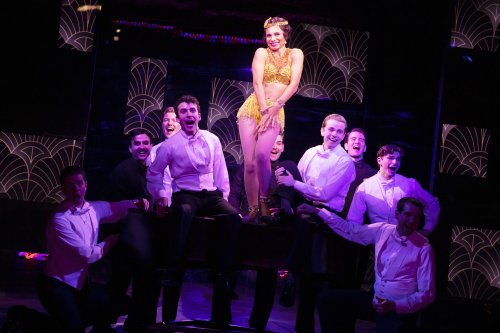
Sean Bell, Barrett Riggins, Eric Peters, Danny Kornfeld, Ana Hoffman as Josephine Baker, Matthew Mucha, Steven Telsey, Blake Roman and Zal Owen in a scene from the National Yiddish Theatre Folksbiene production of the Barry Manilow/Bruce Sussman musical “Harmony” at the Museum of Jewish Heritage (Photo credit: Julieta Cervantes)
Except for the composite portrait of Ruth who was not Chopin’s only wife, the show remains faithful to the known facts about the Comedian Harmonists. One of two stage musicals by the team of Manilow and Sussman the other being Copacabana – The Musical not yet seen in New York, Harmony proves to be an entertaining and absorbing show derivative of many earlier Broadway classics. The cast and production are polished and practiced while the story of the Comedian Harmonists is one that should be more widely known, if for no other reason than as a cautionary tale in our time of rising totalitarian governments and short memories about the Holocaust.
Harmony: A New Musical (April 6 – May 15, 2022)
National Yiddish Theatre Folksbiene
Edward J. Safra Hall at the Museum of Jewish Heritage, 36 Battery Place in Battery Park City, Manhattan
For tickets, call 212-655-7653 or visit http://www.NYTF.org
Running time: two hours and 35 minutes including one intermission






Leave a comment